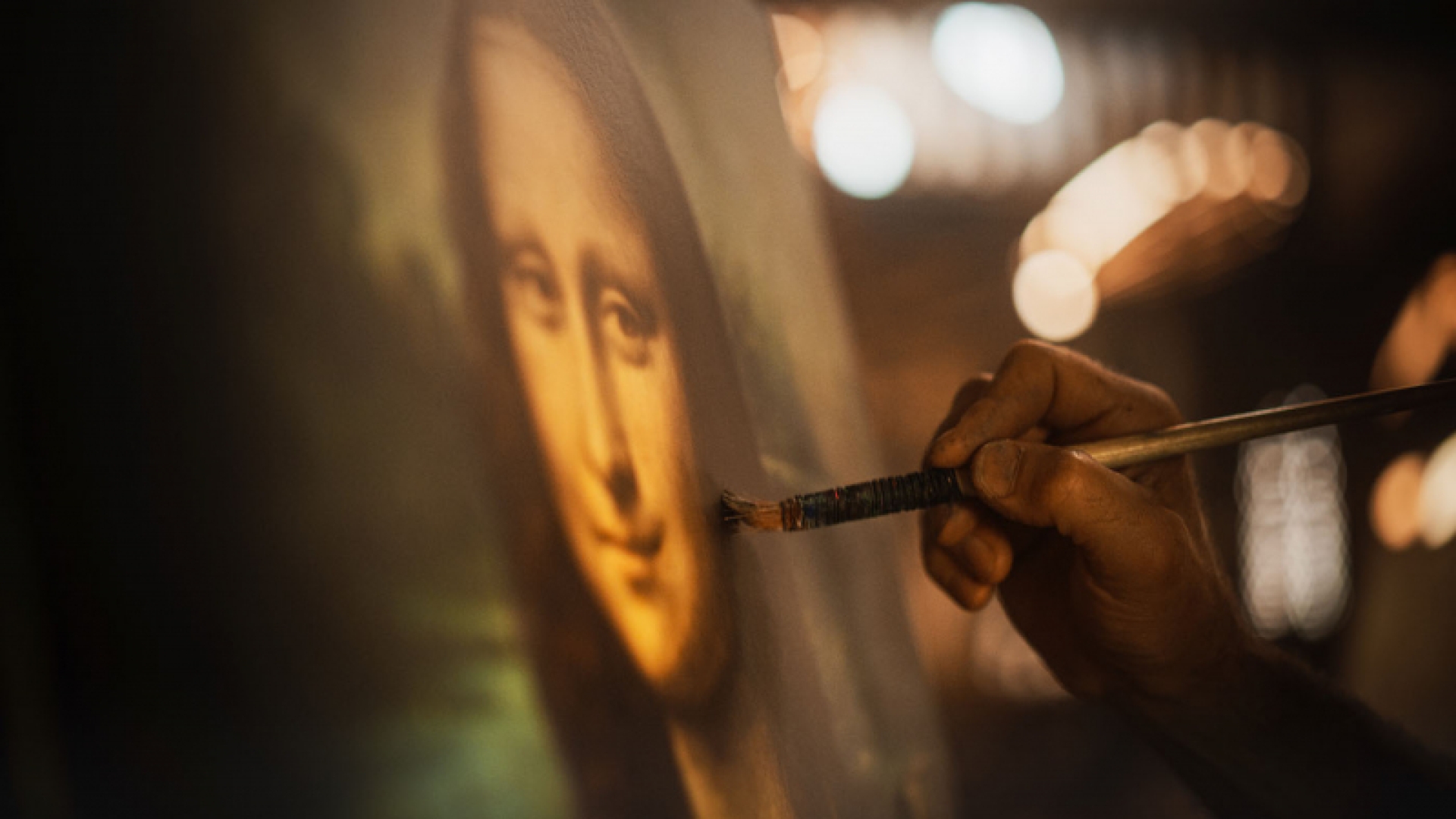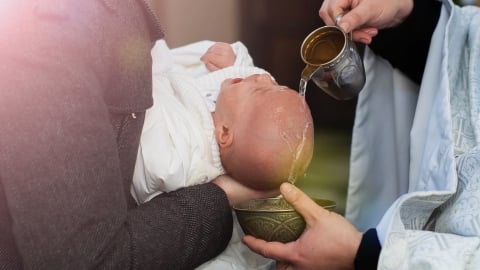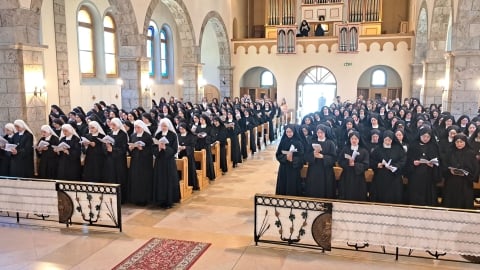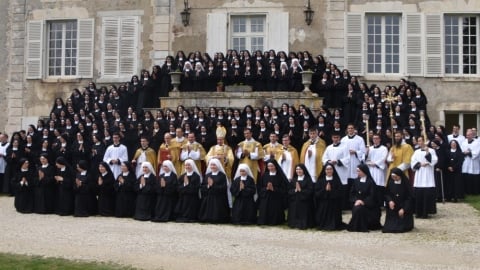Feminine Beauty and Modesty: Part 2

This is the second part of a two-part sermon given by Fr. Louis Pieronne, SSPX. The specific theme of this part is beauty and adoration.

Start with Part 1 of This Series
Feminine Beauty and Modesty: Part 1
The specific theme of the first part is beauty and modesty.
The Lost Wealth of Christian Civilization
The loss of principles is what brought about the loss of the customs that embodied them. Customs can evolve and yet express the same things. Christianity expressed itself differently in the East than in the West. What is worrisome is not the evolution of customs, but the change in the principles that inspire them. We are losing Christian customs, and an atheistic, materialistic spirit is entering the void they leave. Christian custom is born of the spirit of faith. It is the faith lived out. The disappearance of Christian morals and manners amounts to the faith no longer lived. It means our faith is fragile and at risk. We have to hold strongly to a Christian manner of living: not as a fashion, but as a spirit animating daily details. Custom brings a principle to life and transmits it. It is an instrument, and changeable. Customs we can change, but not principles, not a spirit, because we do not change Faith.
To Live the Plan of God
We believe that the diversity of creation is a reflection of God’s superabundant riches. When God gives Himself in the Trinity, He gives Himself perfectly and each person possesses all the divine qualities. The three Persons are absolutely equal. When God creates, He bestows limited being, a measure of qualities, shared out for the harmony of the whole. Creatures are unequal so as to be harmonious in their imperfection. The more there is inequality and diversity, the more qualities are expressed, and so the reflection of God is made all the more perfect.
God places the reflection of His most noble qualities in His spiritual creatures. They say that every angel has a different nature. Man also has a very special place in this reflection of God. Genesis tells us that God created man in His image and likeness. God makes humanity a vast multitude, so that each individual might be unique and his life might enrich the harmony of creation, expressing a unique aspect of that same human nature in the image of God.
God willed that there be a diversity of individuals, temperaments, races, and cultures in humanity, and most of all He established in creation the most marked and the most complementary diversity, that between man and woman. We can therefore seek to know the mission proper to man and to woman specifically as reflections of divine qualities. This question is very important because a human being, as a conscious agent, does not fulfill his role in a blind manner: he knows his mission and fulfills it freely. Man and woman therefore have to understand and willingly carry out the particular mission that God confided to them in making them different. There is a mission common to all women and one common to all men, although enriched still more by the specificity of each individual.
This mission expresses itself in Christian custom, through which men and women each fulfill and transmit that original responsibility which harmonizes creation and humanity, enriches the individual, and makes the wealth of the Creator better known.

Further Reading on the Topic:
The Angelus - Sept/Oct 2021: Women and the Church
The issue’s theme invites you to explore the important role women have played in the Catholic Church from its divine establishment through the present day. Rather than present a “theory” of the proper role of women in the Church, we have opted to provide informative and edifying accounts of the myriad contributions that women have made to the Corpus Mysticum through the centuries.
The Mission of Beauty
Beauty is that particular reflection of God which corresponds to femininity, nor has man ever dared dispute it for his own. Beauty is a transcendental like truth and goodness: created beauty is indeed a reflection of eternal beauty.
A human being is composed of body and soul, and a person’s beauty is in both together, the beauty of the soul overflowing onto the body. Human beauty is not a mere physical beauty but a living, spiritual beauty. Likewise, to be a woman is not a mere biological reality, since the body helps make up the whole person: femininity involves the soul as well. Feminine beauty is the crowning of the physical universe precisely because it touches the spiritual. That integral human beauty is the highest degree of visible beauty.
We have said that beauty belongs to woman as her privilege. This beauty is the work of God, the fruit of His intention. Possessed by a being endowed with reason who is aware that it is a gift, beauty becomes a responsibility, for it has a purpose: the glory of God. We will therefore be obliged to render an account for this beauty at our judgment.
The purpose of beauty is to reflect God and lift the soul higher. Like the authority of paternity, it is a duty and a charge. Each of us has a duty toward beauty, but for woman this duty is greater and more intimate: she is charged with the beauty not of a work but of herself.
To receive beauty as a heritage means being responsible for the effect produced in every gaze that it attracts. The power of beauty is formidable, capable, since the Fall, of the best and the worst. Henceforth, the beauty of the flesh is able to conspire against the beauty of the soul, passion against virtue. Sensible beauty is a source of passions which can abase man or elevate him: concupiscence or admiration; seduction or courtesy.
Modesty is now necessary if beauty is to remain a reflection of God. Noble and virtuous beauty continues to lift souls upward. Sin has not taken woman’s mission from her any more than it has taken authority from man. It has merely made both of those missions more difficult to accomplish.
Ambassadress of God
As a reflection of God, beauty must know how to manifest Him but also how to eclipse itself before Him, not becoming an idol by taking His place. Beauty has a role of ambassador.
An ambassador is the representative of a sovereign. He receives honors in the name of his master and also speaks in his name. However, when the sovereign himself is received, the ambassador is no more than a simple servant in his presence. To render homage to an ambassador when his master is present would be an insult to the master and no longer an honor. If the ambassador takes the stage in the presence of his master, he is no longer serving his authority but usurping it.
Woman is like an ambassadress of divine beauty. Consequently, she is not to receive homage in presence of her Lord, or she would be usurping His glory.
Thus, when a woman offers to the world the brightness of the femininity which God gave her, she honors her Creator and fulfills her mission. Yet when she crosses the threshold of the sanctuary and enters the presence of invisible, eternal beauty, it becomes offensive for her beauty to be too much in evidence.
The Sanctuary of Invisible Beauty
To attract attention and admiration in church is to stand as an idol in the sanctuary and steal the glory of God. Consciously done, it would be a sin against the first commandment: God alone shall you adore. Such is the case, however pure and noble one’s personal beauty. The reflection ought to eclipse itself before the source. If God shone out in His temples in a visible manner, all created radiance would disappear in His brightness; but because He hides Himself, all that is not object of worship ought to hide itself so as not to usurp.
Man is bareheaded in church as a way of setting down before God the sign of his authority, normally worn on his head covering. Here, God alone is Master. Woman cannot remove her beauty and so she veils it. To veil is to hide. Woman hides her visible beauty before the invisible beauty whom she serves. “Non nobis, Domine, sed nomini tuo da gloriam.”
To set down one’s beauty or one’s authority in the presence of God is a way of setting the weight of one’s responsibility down before Him so as to render an account. It is a form of rest which God grants to us, a few moments in which we can disappear without bearing the responsibility of being the light of the world: a moment of renewal, letting God replenish our soul with His invisible beauty that it might shine the more brightly in the world.
To eclipse oneself in this manner before the presence of God becomes a habit of soul, a kind of need for all those who bear their beauty as a divine mission, a demanding responsibility, and at the same time their honor and their greatness.

Further Reading on the Topic:
The Art of Parenting
"Our task is to form the children entrusted to us. The goal is strong children; strong in the soul, strong in mind, strong in heart—Christ-like. Children who are upright, faithful, sure-in-judgement, responsible-in-duty, and great in heart."
—Fr. Beck in "The Art of Parenting"
The Oblation of Beauty
Since beauty is a mission, it is not to be veiled by ugliness, which could never be in the service of divine beauty. To disown one’s beauty through slovenliness, vulgarity or negligence is to refuse the divine mission. The manner of dressing in the sanctuary remains beauty, but a veiled beauty, hiding itself. A religious sister does not seek ugliness; she renounces her radiance because her consecration places her continually in the presence of God, and therefore hidden before Him. She bears witness to the presence of that invisible beauty which conquered her heart by making herself in a way invisible, transparent, perpetually veiled. For other women, that beauty ought to be unveiled on leaving the house of God: the Ite missa est is a return to her mission in the world. When a Christian woman leaves the church where her God is enthroned, she is no longer in the sanctuary, but the sanctuary is in her. She is once again the ambassadress of the beauty which dwells in her and which it is her mission to express.
There is nothing more noble or more symbolic than to see a Christian woman slowly go back down the aisle of the church, her eyes lowered in recollected thanksgiving, her forehead shadowed by the veil, herself hidden in God; and then cross the threshold of the church, appear in the light of day, modestly set her veil back on her shoulders, and offer to everyone the radiance of a smile transfigured by the divine presence which dwells in her.
The gathering of the faithful on the church steps after Mass is a treasure of Christian society: the beauty of the children of God united in the grace of communion and sharing their joy. Nowhere is the beauty of women more pure and transparent, nowhere is the authority of man more noble, than when they rise from kneeling. Each has been strengthened to pursue the divine mission of restoring all things in Christ. Those moments are like an echo of the lost garden of paradise and a foretaste of heaven, where the beauty of glorious bodies will be a pure expression of divine grace.
Truth Sheds Light on Beauty
The wearing of a veil in church is therefore not a question of purity or modesty but of adoration, of homage rendered to God. The problem of modesty has no direct relation to presence in the Church. It is obvious that a sensual beauty which draws toward sin has no place in the house of God, but it has no place in a Christian life at all. Its presence in a sacred place adds an aspect of sacrilege, as for any other sin committed in God’s temple.
There are consequences to this understanding of the veil. The Christian fashion of the moment does not always correspond to such a view. The veil becomes a veil again: not a fashion statement, not a shelter against the weather, not a flower basket for high-society gatherings. It is the veil which hides, in humility and recollection; the veil which allows to fade into the background. (Though we must not be too demanding: it takes time for ideas to settle in deeply.)
In the same light, we recognize more clearly the stark difference between Christianity and Islam. For a Moslem, God does not live in the soul. There is no concept of sanctifying grace. The Christian woman considers herself as the temple of God. This presence shines through the noble, modest beauty which God gave her not merely to please her husband but to reflect His own glory. For Islam, woman cannot reflect anything of God, who is authority without love. Her physical beauty can only awaken passions, and these earthbound passions are reserved for her husband. Logically, then, she ought to hide her beauty from everyone else but him. Christianity distinguishes the share of intimate beauty which the wife must effectively offer to the one whom she has chosen (St. Paul reminds us that the wife has a particular duty to please her husband), and the share of beauty which shines through her femininity onto all those with whom she shares life in society.
Wisdom of the Church
The Church is the guardian of modesty and also of the spiritual role of beauty, willed by God as a path of civilization and contemplation. Modest clothing should hide the body sufficiently to silence wounded instinct, yet it should also convey a woman’s femininity, more by elegance of taste and less by emphasis of physical form. According to Genesis, clothing is a gift of God which preserves the mission of woman toward man and her radiance necessary to civilization.
Beauty has a goal; it has a responsibility. Its abuse as seduction is criminal, its sensual profanation is shameful, its lazy neglect is an indignity. Alas, just as men today are abandoning the responsibility of authority, women are abandoning the demands of virtuous beauty. As a result, society becomes more and more disfigured. But a young generation will rise, zealous for the glory of God, zealous to restore all things in Christ by rediscovering the lost sense of duty. May these reflections help to inspire this heroic youth of God.
Fr. Louis Pieronne, SSPX - sspx.org - 12/20/23





